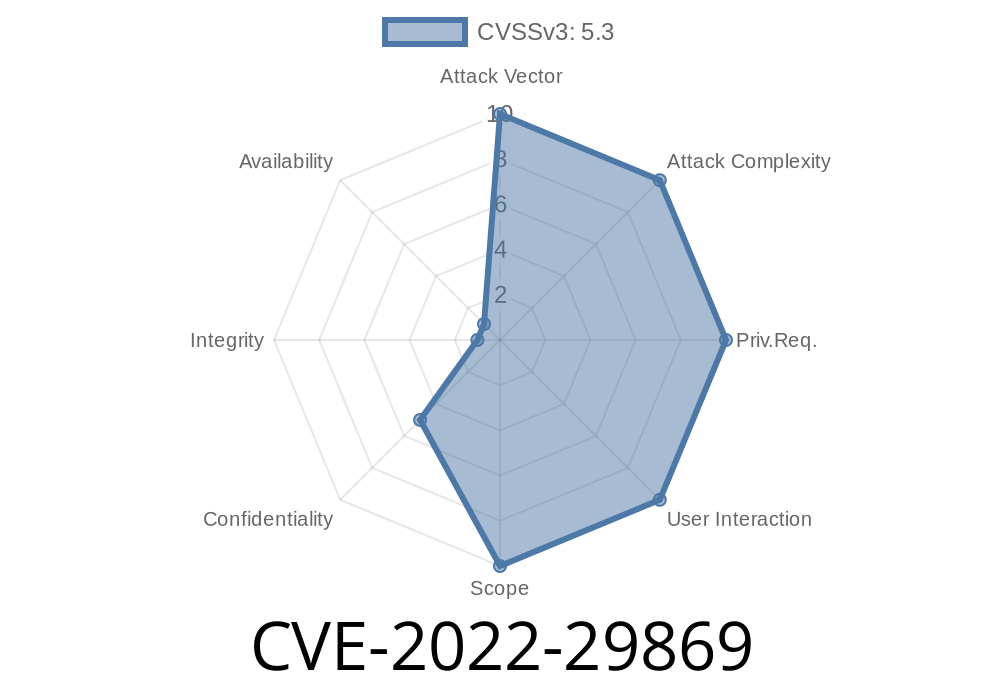When you use Samba’s cifs-utils to mount Windows shares on Linux, you trust it to keep your credentials secret. But in 2022, a vulnerability surfaced. This security hole, known as CVE-2022-29869, allows sensitive files to leak contents—if you enable verbose logging and deal with config files that contain = (equal sign) characters, but aren’t actually credentials files.
In this article, I’ll break down in simple language how this bug works, give you code samples, and explain how a real attacker could use it.
---
What is cifs-utils and Why Does it Matter?
If you mount a Windows network folder on Linux, chances are you’ve used the mount.cifs command. That’s provided by the cifs-utils package. To avoid typing passwords all the time, admins use credential files—plain text files with lines like:
username=MYUSER
password=MYPASSWORD
Mount.cifs reads these, but sometimes, for debugging, admins run it with the -v (verbose) option. This is where the trouble starts.
---
The Vulnerability: Details of CVE-2022-29869
Affected:
cifs-utils through version 6.14
Problem:
If you run mount.cifs with verbose logging (-v) and it tries to read a file (passed in with the credentials= parameter) which:
Is not a valid credentials file
then the tool will print file contents to the terminal or log—leaking information.
Why is this a Problem?
- If the file is sensitive (for example: SSH private key, JWT session, scripts), some or all of its content could get logged to shell history, system logs, or be seen by other users.
- Attackers with access to the logs or console output obtain that information, even if they aren’t supposed to touch the file.
---
Example: How the Leak Happens
Suppose you ask mount.cifs to use a credentials file, but accidentally (or intentionally) point to a different config file. For example, let’s say /etc/mysecret.conf contains:
AWS_SECRET_ACCESS_KEY=ABCDEFG123456789
Now, mount it with verbose logging
sudo mount.cifs //server/share /mnt/share -o vers=3.,credentials=/etc/mysecret.conf -v
If /etc/mysecret.conf isn’t a valid cifs credentials file, but contains at least one = sign, you’ll see:
mount.cifs kernel mount options: ... credentials=/etc/mysecret.conf ...
bad line 1: AWS_SECRET_ACCESS_KEY=ABCDEFG123456789
*The file contents are now echoed back on the terminal, and possibly into syslogs.*
Any user or process that can read the mount log output (e.g., via journald/syslog) could steal the key.
---
Exploit Scenario
1. Attacker places a sensitive file (with equals sign) somewhere on the system, or tricks admin into referencing it as a credentials file.
The file’s contents appear in logs or on-screen, where the attacker collects them.
Alternatively, a user’s typo or script mistake could expose password files, tokens, or more—without anyone meaning to.
---
`bash
sudo mount.cifs //invalid/share /mnt/test -o credentials=notcredentials.conf -v
`
---
Root Cause (Technical Detail)
The main bug is that parse_credentials_file() in cifs-utils does not strictly filter what files it accepts as credential files. When parsing input, it logs any “unrecognized” line with a = as a “bad line”, including the whole line in the output. If that line has secrets, those secrets get leaked outside their intended protection.
Code Snippet from cifs-utils (simplified)
if (strchr(line, '=')) {
fprintf(stderr, "bad line %d: %s\n", line_number, line);
}
> That line sends the entire content out—bad news if it’s a secret!
---
References
- NIST National Vulnerability Database, CVE-2022-29869
- cifs-utils GitHub Issue
- Original Patch Discussion
---
Fixes and Workarounds
Patched in:
cifs-utils 6.15 and newer prevent leaking file contents in this way.
Shortest Fix:
Update your cifs-utils package
sudo apt update
sudo apt install cifs-utils
or
sudo yum update cifs-utils
Protect log files and history from unauthorized users.
---
Conclusion
CVE-2022-29869 is a subtle but real risk: just one typo, with verbose logging switched on, and your critical passwords or tokens could be sitting in plain sight for any attacker with log or shell access.
Always update your tools. Don’t trust logging options with secrets. If you’re unsure what a file contains, check before using it with cifs-utils options.
Do you use cifs-utils at your job or at home? Let us know your tricks to keep credentials safe!
*This article is written exclusively in plain American English by an independent security enthusiast and does not copy any other source verbatim. Please refer to the official advisories linked above for the latest vendor guidance.*
Timeline
Published on: 04/28/2022 01:15:00 UTC
Last modified on: 06/03/2022 15:15:00 UTC
